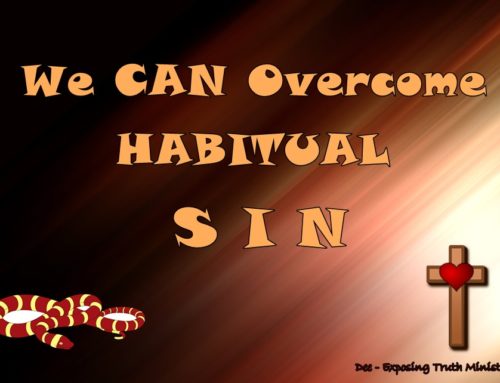I write this article in hope that it will bring some balance to the teachings on positive confession which is preached by many that are considered Word of Faith teachers. The purpose to this article is not meant to discourage those that believe in the Word of Faith movement but I believe some people have misused the teaching on speaking positive and some have taken it to an extreme which has turned a lot of people away from Christianity. The Word of Faith movement has brought emphasis to the necessity of faith which is needed, but it has also encouraged legalism and false confession.
I would like the define what I believe is positive and negative confession. Confession is “owning something”, “affirmation of something believed”. Having a Positive confession is acknowledging or owning desirable situations and a Negative Confession is acknowledging or owning undesirable situations. The word of God teaches us about the power of the tongue and how it can destroy or build up; life and death is in the power of the tongue (Prov 18:21). Speaking life is always uplifting or positive which is good for your spirit and your soul. Speaking negative can pollute your mind, destroy hope and self-esteem, and breed depression amongst other physical ailments; the Lord warns us that “The tongue also is a fire, a world of wickedness among the parts of the body. It pollutes the whole person, sets the course of his life on fire, and is itself set on fire by hell” (James 3:6).
Of all the scriptures referenced by some that teach positive confession, there is a doctrine based on Romans 4:17, that I believe is preached and taught incorrectly; it is “speaking things into existence”. I have heard many teachers say that we are told to “speak things that are not as though they were; if we have faith and believe that the words out of our mouths are powerful, they will produce what we ask for”. Wow, can we really speak a thing and have it happen? No. So what does Romans 4:17 (which refers to Genesis 17:5 when God spoke to Abraham) actually say:
As it is written: “I have made you a father of many nations.” He is our father in the sight of God, in whom he believed–the God who gives life to the dead and calls into being things that were not. (NIV)
which says (as it is written, “A FATHER OF MANY NATIONS HAVE I MADE YOU”) in the presence of Him whom he believed, even God, who gives life to the dead and calls into being that which does not exist. (NASB)
That is what the Scriptures mean when God told him, “I have made you the father of many nations.” This happened because Abraham believed in the God who brings the dead back to life and who creates new things out of nothing. (NLT)
(As it is written, I have made thee a father of many nations,) before him whom he believed, even God, who quickeneth the dead, and calleth those things which be not as though they were. (KJV)
I have read numerous versions of the Bible and all of them say that it is God that calls thing into existence, not man. I could not find any scripture that even implied that God gave man the power to speak things into existence. To me this doctrine is about having faith in your words instead of having faith that God will do what is best and accepting His answer.
I fell victim to this doctrine when I was a baby Christian on fire for the Lord. I had been a Christian most of my life but I wanted to learn more about having a relationship with the Lord. I was reading the word but depended on others to encourage and teach me. When my son became ill, I “spoke into existence” that he was healed. No one could tell me anything different because my faith was strong and I had “called things that were not, as though they were”. When I was called to the hospital by my family, I took my time getting there because I truly believed God had healed my son. When my son died, I was devastated and turned from God. My faith was strong, so what happened? Why didn’t it work for me? Was God angry with me? Was I not saved? Was I not worthy? Was it a sin I committed? I stopped all communication with God. If not for divine intervention, I would have completely walked away. What that doctrine lack is the truth. No matter how hard you pray, what words you speak and believe, it is all about God’s will for your life (1 John 5:14, Romans 8:27, 1 John 5:14, Hebrews 10:36, Col 1:9-12, Romans 15:30). Jesus invites us to submit our requests to God in prayer and faith, but the bible makes it clear that our requests are granted in accordance to His will. We are to pray with faith because we do not always know God’s personal will for our life, or those that we love. I was not prepared for the possibility of losing my son. Some people may think “how stupid”, but I was like many of you reading this…learning and trusting. I now read the word for myself and ask God to provide revelation. Yes, I listen to other teachers but if what they teach does not line up with my understanding, I study to make myself approved (2 Tim 2:15). After all we are warned that “For the time will come when they will not endure sound doctrine; but wanting to have their ears tickled, they will accumulate for themselves teachers in accordance to their own desires” (2 Tim 4:3).
The Word of Faith teaches that God wants his people to be “healthy and wealthy” and we must claim it with positive confession. The scripture that is use to support that statement is (3 John 2) “Beloved, I pray that in all respects you may prosper and be in good health, just as your souls prospers” (NAS), which is a greeting from John to his friend Gaius, not the Lord telling us that we are to be healthy and wealthy. Actually when it comes to our health, the bible tells us that we will be sick and suffer adversity (James 1:2, 1 Peter 4:12-13). Even the Apostle Paul, who suffered from a “thorn in his side”, asked the Lord three times to heal him and instead of healing, the Lord told him “my grace is sufficient”. As for wealth, I could not find any scriptures where it says God’s will is for all to be wealthy; actually (1 Tim 6:6-10) tell us that we are “to be content with what we have”.
I would like to share some situations I have encountered relating to the Word Faith doctrines, or to be politically correct, teachings developed from the Word Faith movement:
- Recently I met an atheist, a young man about the age of 27. I ask him why he was an atheist and he had no problem explaining what had happened in his life. He said he was brought up in church and believed the “speak it into existence” doctrine and it failed him. When he questioned the doctrine he was told, “Son you are impatient, God timing is not always ours” or “Son you don’t have enough faith”. When he went to others outside his church, he was told that maybe it was not God’s will for his life. When he asked, how do I know God’s will, he never got any insight or answers. He eventually gave up on Christ. I pray for this young man often; he gave up on the wrong person.
- A young lady with a disability came to me in tears after she gave up on becoming a minister. She was attending Bible Classes at a church when the discussion of healing and faith came up. She was told by the Pastor that the reason she was sick was because “she did not have faith… all she needed to do was confess her healing and believe”. She became disillusioned and decided ministry was not for her. She still loves God but has no interest in ministering to others.
- I have had many discussions with colleagues about answering a question with a lie in order to speak a positive confession. One example is, I was once asked how I was doing after a battle with the flu. When I replied that I was still under the weather, I was reprimanded that the words out of my mouth are powerful and I should say “I feel wonderful”. My first thought was, what’s the point of asking me if you already have the answer…. so what is this greeting really all about. I don’t have a problem speaking positive about my health, but to lie is totally out of my character. I could have said “I am under the weather but I am believing God to make a change”, but I don’t think about satisfying some unbiblical legalism when I respond to a question. I totally disagree with this doctrine.
- Speaking a false confession is misleading, dishonest and can cause confusion. I have had some clients where our communication has been hindered because of false confession.
- I had a client for deliverance that repeatedly told me that her son use to have a disability but was now healed. She kept telling me that her son’s problem was causing her issues although she had also been healed. I listened for an hour confused and perplexed. Then I asked her what month and year her son had been healed. The answer was “he was healed in the spiritual when I confessed it”. Then I asked her who needed deliverance, she stated that “although I am healed I need deliverance”. I realized that I was not going to make any head way in communication until she realized that faith is required in all that we ask and believe, but speaking a false confession was not going to make it happen. She refused to give up on the false confessions and I had to question everything she said by asking if she was speaking in the “natural” or the “spiritual”.
- I also had a client that wanted help with their child but was in complete denial concerning the child’s condition. I was led to believe the child only need a prayer when the issue was much more serious. I was not prepared for what occurred. When I asked why I was not told the truth, they told me they are “speaking things as though they were”.
I know many of you reading this will not agree when I say that “speaking things into existence” is not biblical. But I ask you to trust the word of God and what the Lord has spoken to you. Bottom line the Lord says in (Deuteronomy 4:2) “Do not add to what I command you and do not subtract from it, but keep the commands of the LORD your God that I give you.
Dee Bowers- Exposing Truth Ministries






Leave A Comment
You must be logged in to post a comment.